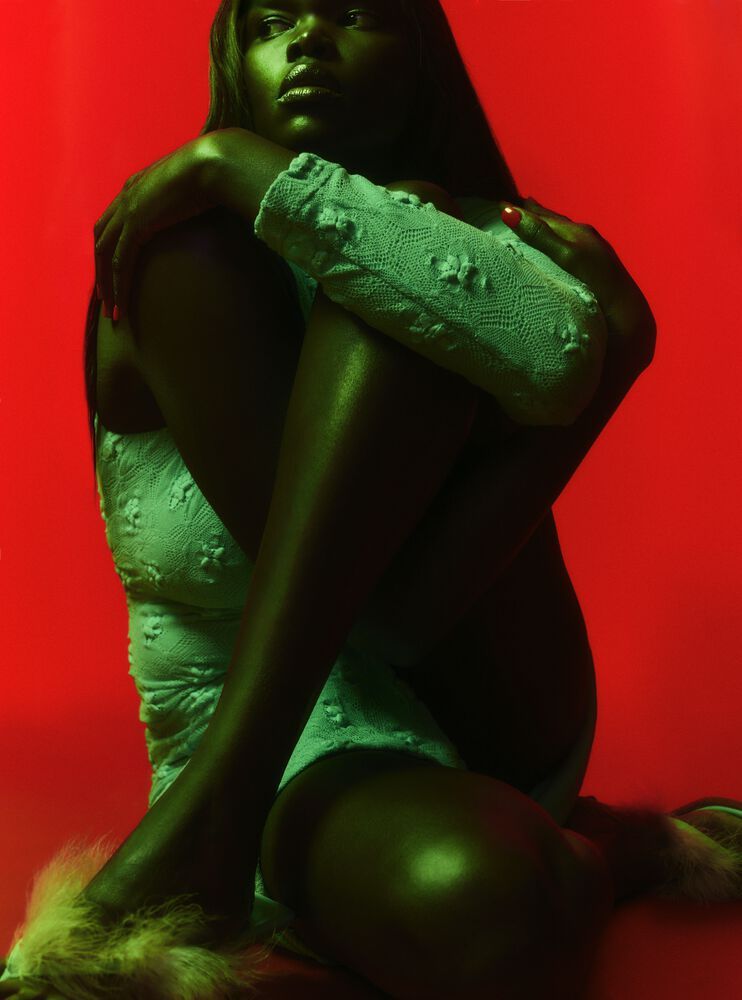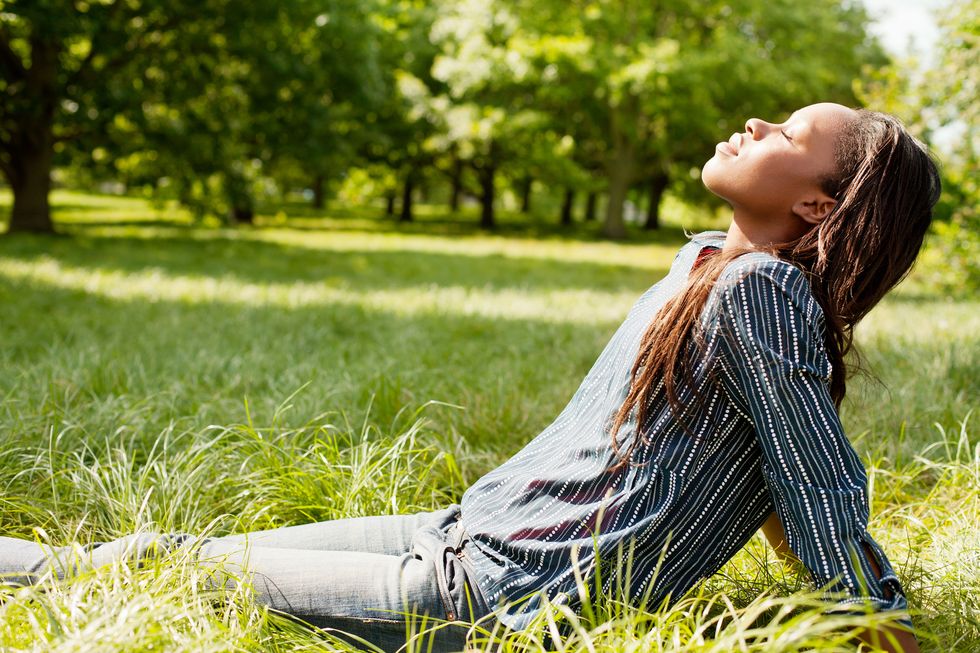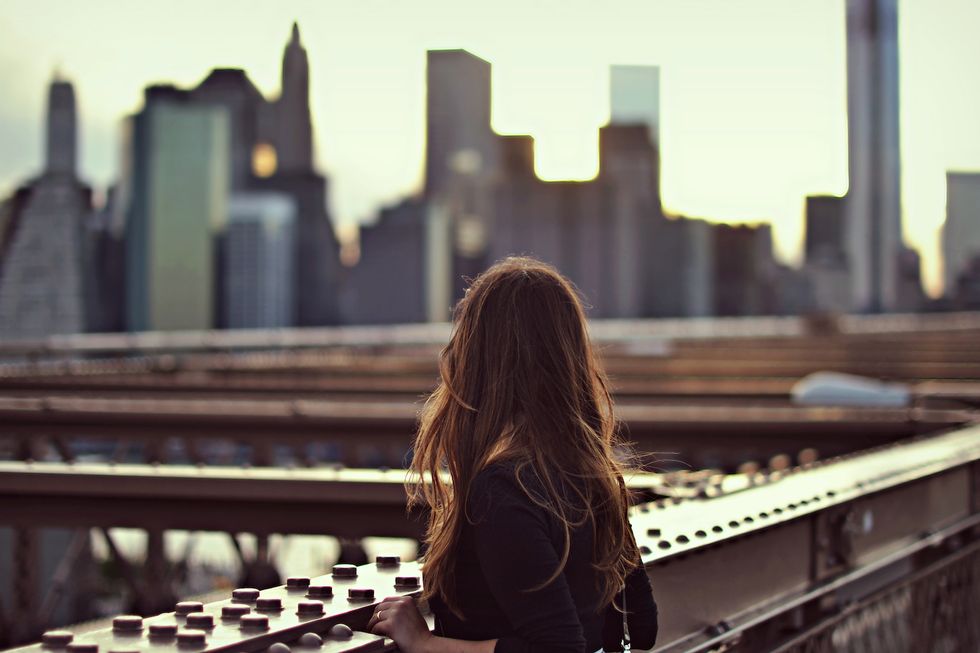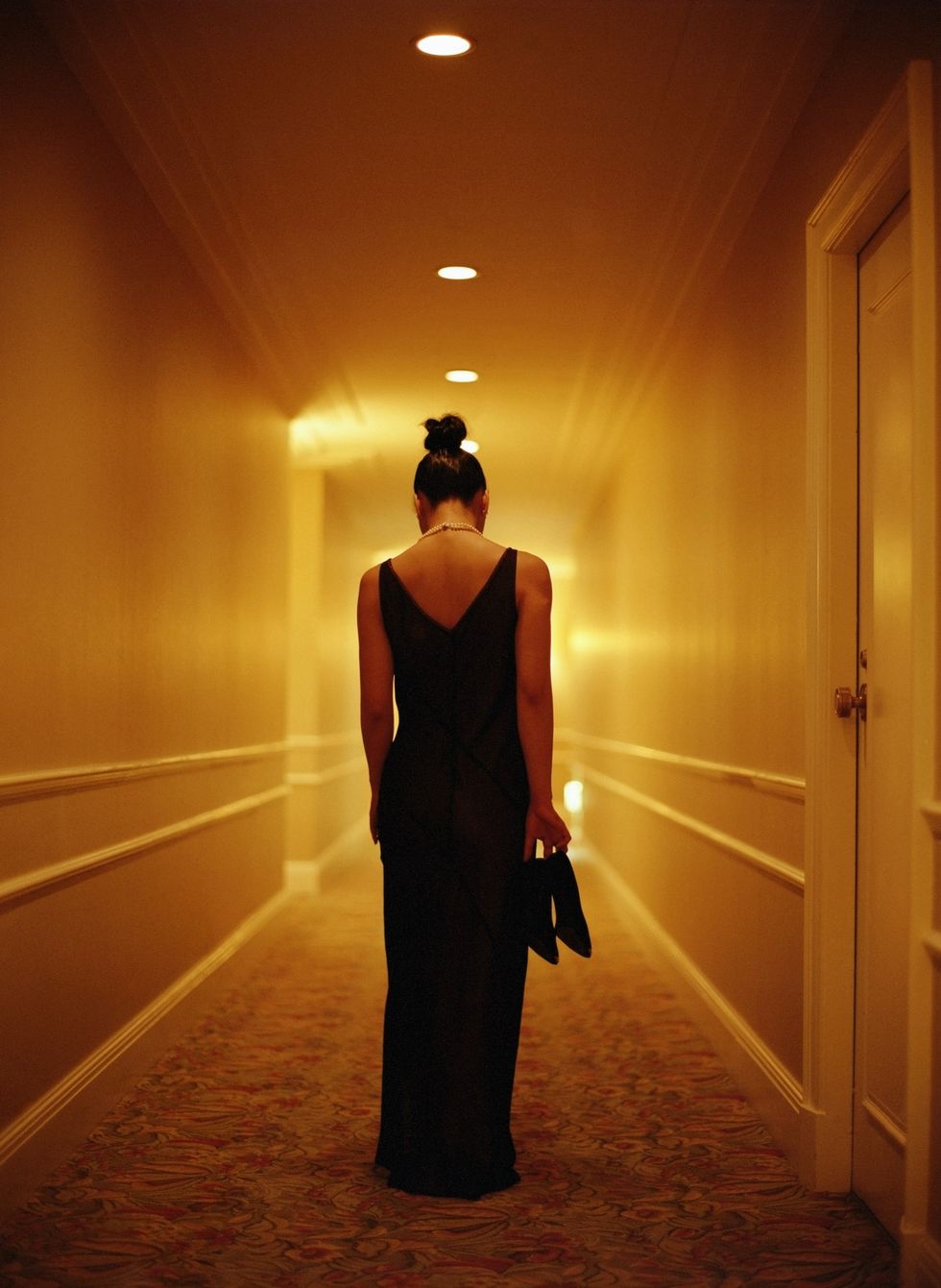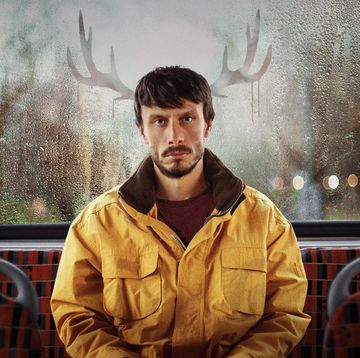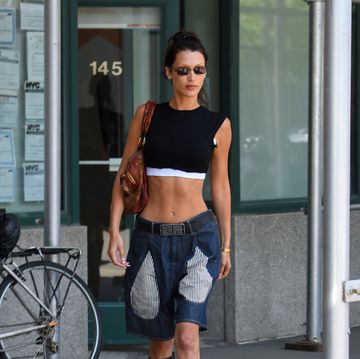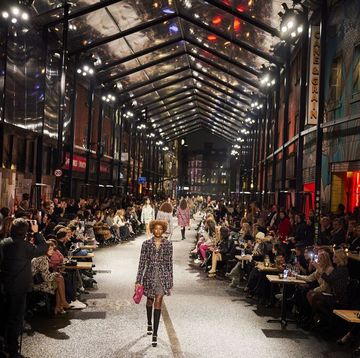It began with a theatre trip to see Seven Methods of Killing Kylie Jenner at the Royal Court Theatre in London. I was working my way through a list I’d made a year earlier, in the midst of the pandemic and my father’s deteriorating health, called ‘All the Things I Want to Do For Myself But Am Too Scared to Do’. The experience of seeing a play on my own was top of the list and, as I headed towards my seat on the first row of the balcony, I turned to the strangers on either side of me, to see if anyone was giving me weird stares. Anxious thoughts began running through my mind: Who would I speak to in the interval? What shall I do if I got bored of my own company?But just as quickly as these worries appeared, they vanished as the lights dimmed and the performance began. I laughed along with the rest of the audience, listened intently to the monologues and, during the interval, I even struck up a conversation with two women who were sitting behind me. I was free to think whatever I wanted about the play without my judgement being clouded by anyone else’s. As I left the theatre, I realised I had been craving an experience like this for so long, and I felt saddened that I hadn’t had the courage to do it sooner.
I have always been terrified of loneliness. Growing up in north London with six siblings in a Nigerian family meant my household was constantly busy. I shared a room with one of my older sisters and she’d take charge of the TV shows, films and music, so, naturally, her pop culture likes and dislikes became my own. A few years later, my experience as an 18-year-old university student in Bristol mirrored elements of my life back home. I quickly formed solid friendships and was very rarely left to my own devices. I never questioned my lack of alone time; I simply convinced myself that I was a sociable person.
Fast forward to 2020, and my father’s ill health and a global pandemic completely reframed my outlook on loneliness and solitude – but not in the way I’d expected. Although I had a full-time career, and my house was always filled with health professionals, as well as my brother, whom I could confide in, I’d never felt lonelier. As my father went in and out of hospital, and lockdown restrictions shut down our social lives, I sat with my own thoughts for the first time in my life and was forced to identify what I was feeling – sadness, guilt, anger and everything in between. It made me question what my life could look like if I allowed myself to feel all my emotions fully, instead of cowering away from them. Even acknowledging this challenge felt like a milestone; I wondered what else I would learn about myself without any distractions.
Loneliness is defined as the ‘state of feeling alone and being sad about it’. According to Dr Audrey Tang, the psychologist and author of The Leader’s Guide to Mindfulness, loneliness can manifest in several ways. ‘Social loneliness is a feeling of sadness or pain because you don’t have people around you, like friends, or maybe colleagues. Emotional loneliness is the same feeling, but you can specify who you are longing for, and it may be triggered by grief or a break-up,’ Dr Tang explains. ‘Loneliness is not about being able to count how many friends you do or don’t have. You can feel isolated in a crowded room, on social media with thousands of followers, or at a party.’ Both forms of loneliness are commonly conflated with solitude, but the latter state is about feeling content when you’re alone. ‘Solitude doesn’t come with the same feelings as loneliness. I’d like solitude to receive the respect it deserves, as it gives you the time to rediscover who you are, and what hobbies you like, and allows that respite,’ says Dr Tang. ‘It’s an enjoyment of your own company – and there isn’t anything wrong with that.’
I’m not alone in my apprehension around being on my own. Back in 2018, the UK government recognised a surge in loneliness and appointed the world’s first ‘loneliness minister’ to help tackle what was considered a growing public health challenge. In 2021, the then Minister for Loneliness Baroness Diana Barran warned we were still in a ‘critical stage’ of tackling the issue and that those who felt isolated pre-pandemic would likely continue to feel the same way once social restrictions had been lifted. A survey in May 2022 by the non-profit organisation Campaign to End Loneliness revealed that 3.3 million people living in the UK felt chronically alone (compared with 2.6 million people the year before). There’s no doubt that this is a growing social issue that should be taken seriously, but we also can’t assume that all forms of being alone are negative.
Prior to the pandemic, the only way I was able to soothe what I recognise now as social loneliness was by filling any potential ‘me’ time with people. Lots of people. I’d run myself into the ground trying to stick to plans I’d made weeks or sometimes mere hours before, just to make sure my mind was occupied, and I was always in somebody else’s company. It meant I’d often be the last one to turn up at restaurants or I’d double book myself without realising my mistake until it was too late.
When all of this whirling around disappeared during the lockdown period, I realised I didn’t know who I was outside of caring for others and working. I started listing all the activities I’d longed to do purely for myself, but felt I couldn’t, for fear of being judged as a woman on my own. It can also be hard to shed routines and the labels given to us by loved ones. Our inability to see ourselves outside of how others view us can be attributed to, ‘the looking-glass self,’ Dr Tang says. ‘The problem is, if we always see ourselves through the eyes of others, once we become identified for our role as “Mum” or as “the friend who organises”, it becomes quite difficult to step out of that label that someone else has given us,’ she explains. ‘And so, by spending time with ourselves, we get to know who we are again.’
My father passed away in August last year from kidney failure, 11 years after my mother’s death. As his funeral arrangements coincided with the loosening of Covid restrictions and the world’s gradual reopening, I returned to the list I’d made to help cope with my overwhelming grief and mounting loneliness. After that first theatre trip, the floodgates opened: I went to the cinema spontaneously without having to arrange a time that worked for busy friends too; I spent a solo holiday in Brighton, dining out alone and relishing the joy of waking up to a day of no plans and no one else’s feelings to consider. I bought last-minute tickets to gigs in intimate venues. Surrounded by a sea of people, I still felt an innate disconnect, but it didn’t take long to realise that this was OK too. The loss of my father, such a great figure in my life, is one of the worst and most heart-breaking experiences I’ve ever faced. But suddenly, the idea of being in crowded spaces without the comfort of familiar faces didn’t feel as intimidating. Being alone provided a sense of escapism, if only for a few hours. To the outside world, I wasn’t a grieving person; in that moment, the sense of anonymity was freeing and restorative.
Socialising to cope with trauma is a common response, but somewhere down the line we must face our feelings. ‘Socialising is a method of self-soothing,’ Dr Tang tells me. ‘It might not be the most helpful. If we can allow ourselves to stick with our emotions, even the sad ones, for a little while, we will begin to realise they are simply emotions. They are like clouds that pass through the sky. Block out chunks of time in your calendar for yourself, much as you would when you have a meeting. By doing that, we begin to reflect on important questions as we rebuild our social life: “Who is it that I really want to spend the time with? Which relationships are reciprocal? Which friendships are based on laughter and are energising?” Journalling can be another way to cope during moments of quiet introspection, Tang concludes. ‘You don’t need to share your writing, but just get that information out and onto the page; it can make you feel grounded and good about yourself.’
The New York-based writer Julia Bainbridge spends much of her working life scrutinising loneliness and our relationship with it. After she grew tired of the negative connotations attached to loneliness, she set out to challenge the way we view it through her podcast The Lonely Hour. ‘It’s a strange paradox: loneliness is endemic to being human, and yet it’s taboo in our culture. It was important to me to keep loneliness outside of the “problem” box. I wondered, “Could I show how entirely normal it is, through storytelling? Could there even be joy and humour in the mix, as is true to life?” Yes, it turned out, there could.’
As part of her podcast, Bainbridge invited a variety of guests, from nurses to poets, to discuss their understanding of loneliness. ‘The poet and philosopher David Whyte talked about it as, “a doorway to becoming. Quite often, it’s a difficult and vulnerable doorway, and one you don’t want to go through, but one that’s simplifying our life and bringing us down to a foundational understanding of [what] we want and need”,’ she explains. ‘When I think of my guests’ stories, loneliness told people where they needed to go. It can be oddly nourishing if you can make your way through it.’
At the height of the pandemic, when loneliness became chronic for so many people, Bainbridge decided to press pause on the podcast and recalibrate her mission. ‘What we were experiencing is most certainly not the everyday kind of loneliness I set out to examine on the show, which still has value, but I realised there are more urgent concerns,’ she says. Bainbridge, who is now training to become a psychotherapist, is most perturbed by what the former US surgeon general Vivek Murthy named the ‘social recession’: the decline in human interaction that can affect our mental health and ability to work and learn.
In my case, I now realise solitude is crucial to my mental health and sense of wellbeing. It has taken me almost all my life to reach this point of understanding. Feeling content with my own company was a foreign concept to me during much of my teenage and adult life, and now in my late twenties there’s something a little overwhelming (in a good way) about being able to slowly understand what truly brings me joy, and what defines me without the influence of loved ones. Setting aside time for solitude isn’t a linear process, and this journey has made me uncomfortable, vulnerable and incredibly anxious at times. However, I’ve gained a different perspective, and become more proactive and autonomous. Most importantly, I’m OK with just being still; sitting with my thoughts no longer terrifies me.
I’m also not afraid to admit that emotional loneliness is part of my life right now. I miss both of my parents dearly, and being able to identify why I feel the emotions I do hasn’t made my feelings any less valid, but it has helped me shape my understanding of grief a little more and awareness of how loneliness can impact mourning, and vice versa.
Knowing that no one is immune from feeling alone, and that it will forever be a part of my life, brings me some sort of relief. Without a doubt, one of the healthiest ways I’ve been able to accept this about myself has been through taking solo trips, which is a privilege, particularly at the moment. Being able to refuel and take time away hasn’t always been smooth sailing – as I type this, I’m in New York, on day 10 without any luggage (due to the summer travel chaos at Heathrow) – but it has contributed to my self-confidence. Meeting new people and forcing myself out of my comfort zone is a part of growing up that, sadly, I had hardly ever experienced. But now, I’m finally able to be myself and reap the benefits – even if I can’t currently wear any of my outfits while doing so.
This article appears in ELLE's November 2022 issue.
